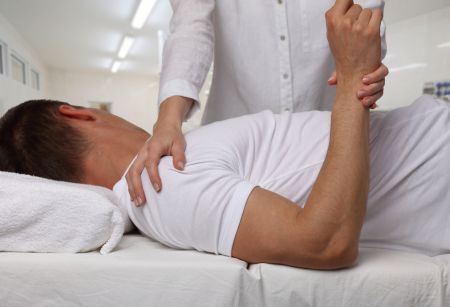Understanding Shoulder Pain: Causes, Diagnosis, and Effective Treatments
The shoulder is one of the most injury-prone areas of the body, particularly due to its wide range of motion. Shoulder injuries often occur when you overdo it, whether you’re smashing serves on the tennis court or painting the living room ceiling.
Common Shoulder Pain Causes
Labral Tear: A tear in the cartilage of the shoulder socket, often from trauma or overuse.
Rotator Cuff Tear: Tearing of shoulder tendons, often from overuse or injury.
Tendonitis: Inflammation of the shoulder tendons from overuse.
Overuse: Repeated stress from activities like lifting or sports.
Shoulder Impingement: Occurs when the shoulder blade rubs against the rotator cuff.
Frozen Shoulder: A condition marked by stiffness and pain, gradually limiting shoulder mobility.
Shoulder Bursitis: Inflammation of the bursa, causing pain and discomfort.
Arthritis: Osteoarthritis, the most common form, wears down cartilage in the shoulder.
Dislocation: Occurs when the upper arm bone slips out of the socket, often due to trauma.
Fractures: Breaks in the shoulder bones (humerus, scapula, or collarbone), usually from trauma.

How is Shoulder Pain Diagnosed?
Diagnosing shoulder pain involves a thorough approach that combines your medical history, a physical exam, and imaging tests. Your doctor will take the time to ask about your symptoms, any recent injuries, and the activities that might have led to your discomfort. During the physical exam, they’ll check your shoulder movement, strength, and tenderness. After reviewing your test results and evaluating your condition, your doctor will walk you through the best treatment options, whether that means non-surgical care or surgical intervention. You’ll be well-informed and supported every step of the way!
Don’t Let Shoulder Pain Hold You Back – Get It Treated Today!
If you’re struggling with shoulder pain, you might find it hard to enjoy the little things—like lifting groceries or diving into your favorite hobbies. But the good news is, you don’t have to let it hold you back any longer! Ignoring the pain could lead to further complications, decreased mobility, and a prolonged recovery. Early treatment not only alleviates discomfort but also helps restore strength and function, allowing you to return to your routine without limitations.
Comprehensive Non-Surgical Treatment Options
Physical Therapy: The physical therapists at Access Sports Medicine can create a personalized rehabilitation program to strengthen shoulder muscles, improve range of motion, and restore function.
Exercise: Gentle stretching and strengthening exercises can help improve shoulder function.
Corticosteroid Injections: Injections into the shoulder joint can provide temporary relief from pain and inflammation.
Platelet-Rich Plasma Therapy: A treatment using a patient’s own blood, concentrated with platelets, to promote healing in injured tendons, ligaments, and joints by stimulating tissue repair.
Shoulder Braces or Supports: These can help stabilize the shoulder and limit movement to allow healing.
Will I Need Shoulder Surgery?
Surgery is only considered when a patient has failed to recover after more conservative treatments. Access Sports Medicine offers the following surgical treatments:
Shoulder Arthroscopy: Shoulder arthroscopy is a minimally invasive surgical procedure that involves inserting a tiny camera into the joint through a small incision to guide precise repairs with miniature instruments, offering benefits like reduced pain, faster recovery, and quicker return to activities compared to traditional open surgery.
Total Shoulder Replacement (Arthroplasty): This involves replacing the damaged humeral head (joint ball) with a metal ball and resurfacing the glenoid (socket) with plastic. It’s not ideal for those with severe rotator cuff damage or wanting high activity levels.
Partial Shoulder Replacement: Also called stemmed hemiarthroplasty, this procedure replaces only the humeral head with a prosthetic while leaving the natural socket intact. It involves a smaller incision and preserves more bone than a full replacement.
Reverse Total Shoulder Replacement: The ball and socket positions are switched, shifting the shoulder’s center of rotation. This allows other muscles to compensate for rotator cuff issues, often reducing pain.
Why Choose Access Sports Medicine?
Experienced Team: Our physicians are specialists in sports medicine and orthopedic care.
Comprehensive Care: From diagnosis to treatment and rehabilitation, we offer everything you need under one roof.
Personalized Approach: Your treatment plan is tailored to your specific needs and goals.
Convenient Locations: We have clinics throughout New Hampshire to serve you


